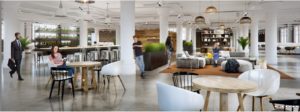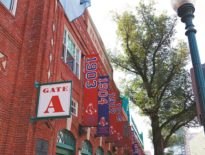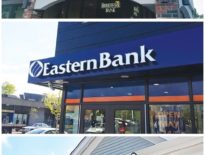Boston Volvo Village owner Ray Ciccolo has seen the Allston neighborhood surrounding his dealership change in just a few years from a gritty auto mile to an office and multifamily development hotspot.
Life science firms and money managers have signed large leases at nearby Boston Landing, and a new luxury high-rise is renting out $4,000-a-month apartments. The simmering real estate market prompted Volvo Village to study how to maximize the fast-rising value of its 5-acre holdings on North Beacon Street. Step one: renovating an industrial building next to its dealership into a “vertical showroom,” with two floors of space for Volvo Village, and two others that are being marketed to office and lab tenants.
“Vertical dealerships are becoming more common in urban areas because the cost of land is so prohibitive,” said Ciccolo, owner of Village Automotive Group. “In the years to come, inventory is going to go down as they try to develop a new model where you don’t store them, because it’s very costly and inefficient.”
Originally built in 1924 as an International Harvester dealership, the 72,000-square-foot brick building with its industrial-capacity floor loads and powerful freight elevator was well-suited for adaptive reuse, said David Bois, a principal at Boston-based architects Arrowstreet, which designed the project. Electric vehicle manufacturer Tesla, with its direct-to-consumer sales model, has introduced portions of the car-buying public to the notion of ordering a vehicle in a downtown storefront or suburban shopping mall.
“These days, people don’t pick a car walking through a lot and seeing what features they have,” Bois said. “You go on the Internet and build the car you want, and (Volvo Village) understood that.”
In a second phase, a 4-acre parcel at 75 North Beacon St. currently used to store approximately 500 vehicles could be redeveloped as multifamily housing. The dealership is studying its development options for the site, which is next to a 11-acre shopping center property where Stop & Shop Supermarket Co. has proposed more than 1,000 condominiums and apartments.

Steve Adams
A Lesson for Brick-and-Mortar Retailers
The Volvo Village project is another example of how the showrooming trend – with smaller store footprints and little or no on-site inventory – is letting retailers use real estate more efficiently. Showroom stores in the 3,000-square-foot range can deliver sales competitive with much larger formats.
Pioneered by omnichannel merchants such as eyeglass manufacturer Warby Parker and men’s clothing seller Bonobos, the strategy is expanding in the apparel, furniture and fitness sectors.
“The Bonobos of the world are doing sales of $3,000 per square foot, and that’s off the charts compared with traditional retail,” said Corey Bialow, CEO of Needham-based Bialow Real Estate, which represents retail chains in their real estate expansion strategies.
At first glance, it might seem unlikely that e-commerce players can beat brick-and-mortar retailers at their own game. But e-tailers have a natural advantage in selecting store locations closest to their core online customers, who have already provided home addresses for delivery.
“They’ve established their brand recognition and their digital sales before they opened the stores, and not the other way around,” said Matt Curtin, a partner at CBRE who heads its Boston retail brokerage. “They’ve figured out where their customers are, what they’re buying and they can tailor the retail locations around those facts that they already know. A lot of them pick the markets they open stores in based upon existing sales, not demographics and co-tenants.”
One of Bialow’s clients, custom suit manufacturer Indochino, used its customer data to target markets that it might have overlooked.
“Everyone thought we should focus on the top-tier markets: New York, Los Angeles, San Francisco,” Bialow said. “We found they had a strong following in areas such as Charlotte and Nashville that wouldn’t be everyone’s first entree into brick-and-mortar.”
As high-end fitness concept Peloton expands, it’s targeting more downtown locations in some markets, including Boston. The New York company is building out a store in the Prudential Center mall, where clients will be able to work out before deciding whether to shell out $2,000 or more for its stationary bikes. An early December opening is scheduled.
Other Back Bay storefronts are starting to fill up with new showrooming concepts, including custom furniture manufacturer Interior Defined at 77 Newbury St. and custom men’s shoemaker M. Gemi at 172 Newbury St. Modcloth, a San Francisco-based purveyor of vintage women’s apparel that was acquired by Walmart in 2017, is scouting potential locations in Greater Boston, according to real estate industry sources. And Boston-based home goods e-tailer Wayfair is testing pop-up shops at the Natick Mall and in New Jersey as it weighs its brick-and-mortar expansion options.
With smaller footprints for showrooms, retailers can afford to splurge on high-end decor and informed customer service.
“You can come in, get a drink, sit on a leather couch and get a personal tailor,” Bialow said. “Retail used to be about making a sale in the store. Now it’s about forming a connection with the brand.”




 |
| 


